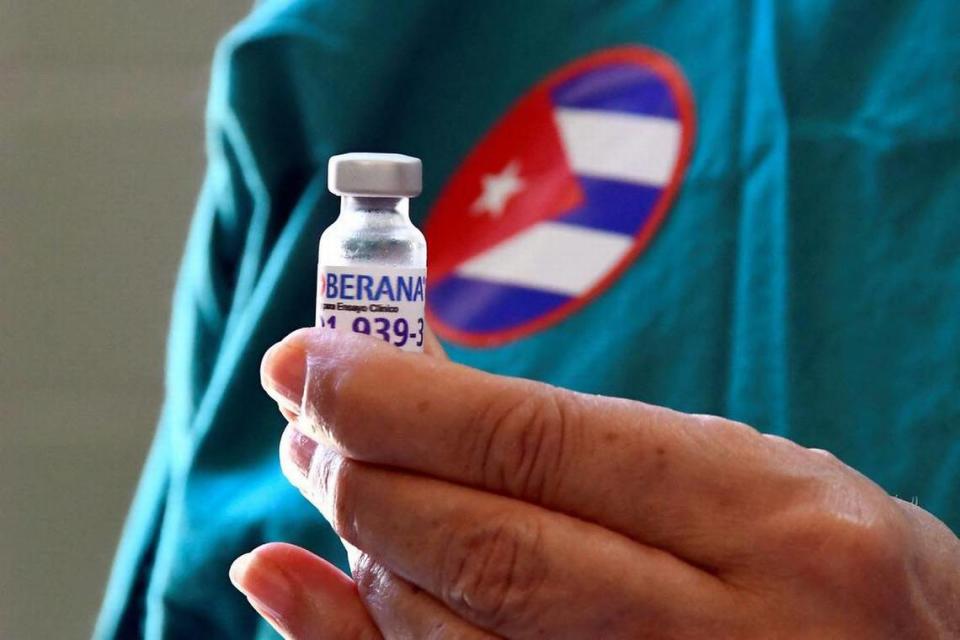Cuba tightens COVID-19 measures amid record spike in cases; Delta variant was detected
Cuba has tightened lockdown measures to fight the COVID-19 pandemic as infection rates and deaths have reached consecutive record highs in the past week, while a vaccination campaign with homegrown shots struggles to gain traction and the highly contagious Delta variant starts to spread in the island.
Public health officials have imposed new measures to limit gatherings and mobility in high-transmission areas such as Cienfuegos, a commercial port town in the sugar-producing province of the same name. All beaches, rivers, lakes and recreational areas have been closed and the work day must end at 2 p.m., according to the provincial government.
In Matanzas, the epicenter of the recent COVID-19 spike and home to Varadero, one of Cuba’s most famous beach destinations, restrictions have also been tightened, with a curfew from 8 p.m. to 5 a.m. and the prohibition of travel to other provinces. With the local health system stretched to the limit, the central government is sending supplies such as hospital beds and dispatching more medical personnel, Cuban leader Miguel Díaz-Canel said.
“No territory is alone in this fight, which involves all of us,” he said Tuesday during a meeting of a group of local government leaders created to deal with the COVID-19 pandemic. “We are now in a truly complex epidemiological situation, in which the models, the data, the statistics and the analysis of the virus’ behavior over the past few weeks indicate that transmission levels are nearing the capacity we have in our health system.”

Cuba registered another record in confirmed COVID-19 cases, with 3,664 people infected and 18 deaths on Wednesday. Positivity rates, or the percentage of PCR test results that come back positive out of total tests performed, are well above the recommended 5% level, reaching 15.3% in Matanzas and 10.2% in all of Cuba, according to the island’s Public Health Ministry.
COVID-19 cases, which totaled just over 12,200 in all of last year, reached almost 195,000 so far this year. Since the start of the pandemic Cuba has registered 207,000 cases and 1,372 deaths, according to the World Health Organization. Though the numbers remain low by Latin American standards, daily case counts soared above 3,000 last week, as tourists continue to arrive after the island reopened its borders to tourism in November.
The socialist regime took a gamble last year when it decided to develop its own vaccine and not order shots developed in other countries. But delays in the development and rollout of the vaccines and the loosening of lockdown restrictions in November created a perfect storm for a spike in infections earlier this year. With numbers rising, the government decided to start vaccinating people in May as part of an emergency intervention, which allowed for the shots to be distributed even before receiving approval by the country’s own regulatory agency. The intervention has focused on high-transmission areas like the capital, Havana, and bigger cities like Santiago de Cuba, but vaccination has been slow in the rest of the country.
WHO tells Cuba to publish its COVID-19 vaccine data and to seek approval for COVAX
The Public Health Ministry said this week that more than 6.6 million doses of the vaccines had been administered between mid-May and July 3. Nearly 1.6 million people received all three doses of Cuba’s Abdala vaccine, one of five candidates being developed by the island nation and the shot with the highest reported efficacy rate of 92.28%, though clinical trial data hasn’t been published in any epidemiological journal or reviewed by the international scientific community. Another candidate, the Soberana 02, which Cuba says has a 62% efficacy rate and requires two doses, is also being administered. About 2.2 million people received the two-shot Soberana 02, according to the ministry.
Details about the vaccine candidates being tested are scarce on the Health Ministry’s trial registry system, but the information provided so far shows they are all protein-based, in which a type of protein located on the virus “spike” is used to promote the production of neutralizing antibodies, basically teaching the immune system to fight off the virus. The technology has been previously used in other vaccines.
Adding to the challenges, local health officials detected the highly transmissible Delta variant of the coronavirus late last month in at least one province, raising the urgency for a faster rollout of vaccines across the island of 11 million.
Ángel Enrique Batista Díaz, health director in Cuba’s central Ciego de Ávila province, said he didn’t want to create a panic, but that now more than ever people must adhere to COVID-19 protocols because the new variant, first identified in India, is more infectious and causes more severe illness. He said his province has repurposed social distancing centers, where people suspected of having COVID-19 would stay while they waited on test results, to treatment centers for those suffering from infection due to the virus. Those who may have the virus but don’t know for sure are being told to social distance at home, he said.
“I know it’s not ideal, it’s a risk, but we don’t have capacity anymore,” Díaz told local newspaper Invasor last week.
Cuba bets on biotech prowess as it rolls out homegrown COVID-19 vaccine

